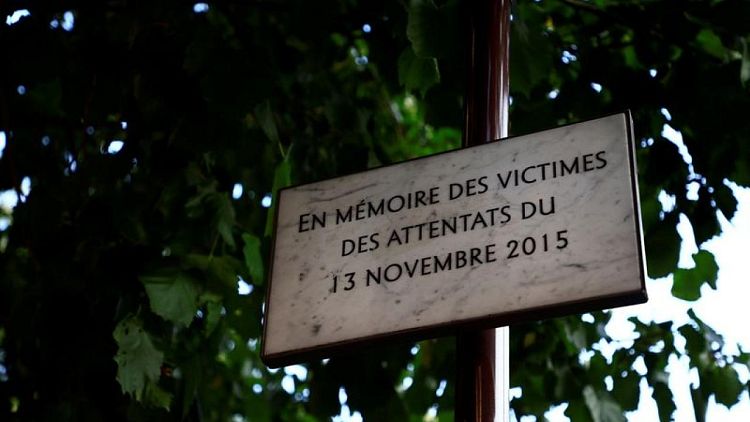By Elizabeth Pineau
PARIS - Six years after a group of Islamist bombers and gunmen attacked Paris, gendarmes who were on duty that night told a court on Tuesday that they were still haunted by the sound of explosions, images of human flesh and the smell of blood.
Three suicide bombers blew themselves up outside the Stade de France where the national soccer team was playing Germany as other Islamic State militants struck bars, restaurants and a concert hall in the capital's centre on Nov. 13, 2015.
The attackers killed 130 people in total.
Philippe, who had been in the force 33 years on the night of the attack, told the trial of the main surviving suspect how he had heard an explosion close behind him, turned around and saw smoke and a naked leg.
"First I thought, 'but what on earth is this display mannequin doing there?' ... I can still see that leg very, very, very clearly," he said in one of the first testimonies of witnesses and survivors in a trial set to last months.
He said he and other police officers on duty at the stadium were trained to face extraordinary situations but that the carnage that night was beyond any training manual.
"That night, and that is why this stays with me day in day out, we were at the explosion, and we first had to absorb the shock, understand what was happening, and improvise, before our reflexes kicked in again," he said.
"What still haunts me is that I was in charge that night... we did the best we could," he said, sobbing.
A second officer, Renaud, had returned to duty that night after a paternity leave break. "It is not over and I do not know whether it ever will be," he told the court.
Pierre, now retired from the force, said he had spent a month in a psychiatric hospital and was still receiving treatment.
"I was shaken by the second explosion, saw a human trunk cut in two, pieces of flesh everywhere, and that smell of blood ... when I got home, my shoes and clothes were full of blood," he told the court.
He said he still has trouble eating and sleeping as he relives the images of the attack.
"That night, the terrorists have sowed terror not just among the victims and the injured. My wife and children and everybody in the family has been hurt by this attack ...that is what the court needs to take into account," he said.
The officers' full names were not given, in accordance with a court ruling.
Questioning of the accused will start in November but they are not set to testify about the night of the attacks until March.
Defendant Salah Abdeslam, 31, is believed by prosecutors to be the only surviving member of the Islamic State cell that carried out the attacks.
Thirteen others, 10 of whom are also in custody, will be in the courtroom accused of crimes ranging from providing the attackers with weapons or cars to planning or taking part in the attack.
Six more, mostly Islamic State officials, will be judged in abstentia for helping organise the attacks.
